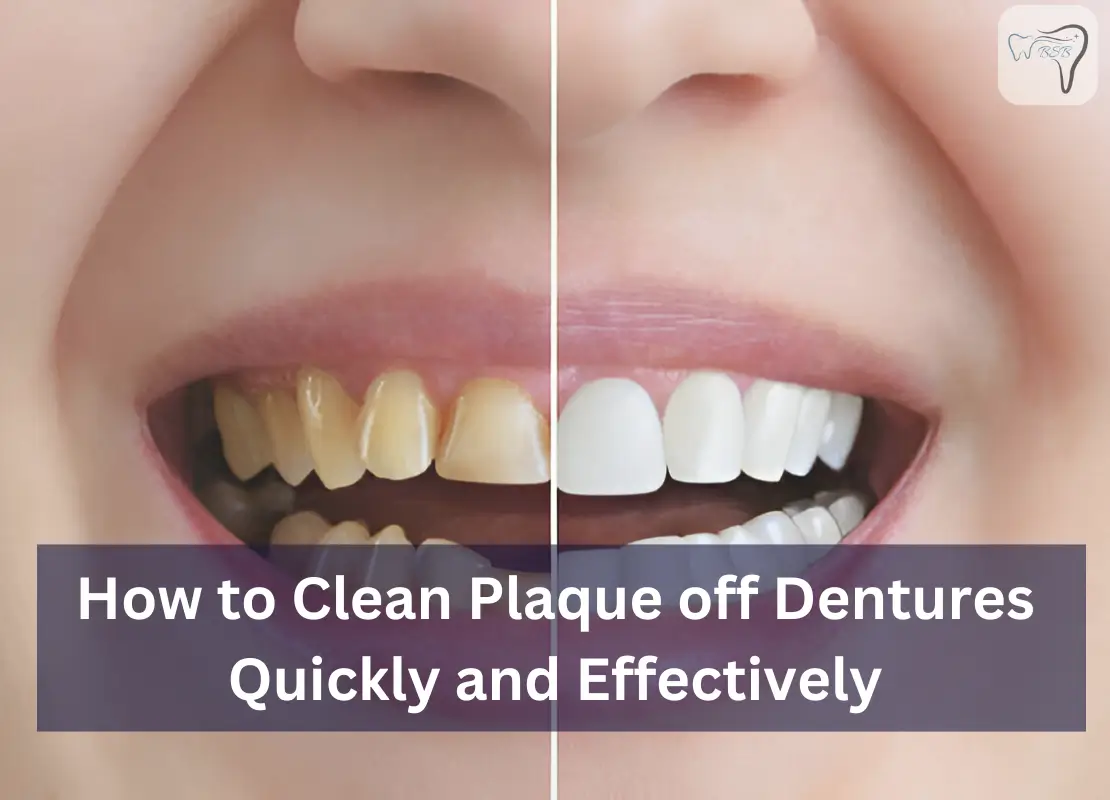As a dental professional, I’ve observed that dentures require meticulous care to prevent plaque, a sticky yellowish biofilm containing harmful bacteria. This abnormal patch on the surface affects oral health, causing discoloration and potential tooth decay.
Beyond basic cleaning and oral hygiene, protecting your natural teeth and maintaining comfort during wear is crucial. The accumulation of tartar in your mouth isn’t just about appearance – it can lead to serious health issues like blood clots, heart attacks, and strokes.
How to Clean Plaque off Dentures Quickly and Effectively(Short Answer)
What is Plaque?
In my 15 years of dental practice, I’ve seen how plaque – a thin, sticky biofilm and bacterial coating – becomes a persistent challenge for use gauze wearers. When you eat or drink, the bacteria create harmful acids that erode your teeth, gums, and tooth enamel. Without thorough prosthesis cleaning performed daily, this buildup can lead to cavities, tooth decay, gingivitis, and gum disease.
As someone who has helped countless patients maintain their dentures, I can’t stress enough how crucial it is to address plaque formation, especially as it affects how comfortably you can wear your dental appliances.
Why Is It Crucial to Remove Plaque Without Delay?
Throughout my decades in dental practice, I’ve witnessed how untreated plaque can cascade into serious oral problems. When not removed regularly, bacteria release harmful acids that damage the enamel of your teeth, leading to visible cavity fillings and tooth decay. More concerning is how plaque can harden into tartar along the gumline, irritating and infecting the gum tissues.
This often triggers gum inflammation, gingivitis, and other dental diseases. As bacteria accumulate, they produce unpleasant sulfur compounds, causing persistent bad breath. Left unchecked, these dental problems can evolve into severe gum disease, making immediate plaque removal crucial for your oral health.
How to Effectively Remove Plaque from Dentures?
As a dental expert, I’ve found several ways to make plaque removal from dentures easier than with natural teeth. While living organisms and microbes form thriving microcolonies that grow on your prosthesis causing tooth decay and bad breath, maintaining oral health is simple.
Use a denture cleaning brush and solution that suits your needs – these teeth cleaning products can tackle buildup on all surfaces and regions in minimal time, ensuring proper hygiene. Here are some of the solutions to how to remove plaque from false teeth:
Clean Regularly
From my extensive dental practice experience, the easiest and most common solution to maintain your dentures is to clean them regularly. Start by giving them a thorough rinse with mildly warm water, then gently wipe them with a soft cloth or towel. If stubborn plaque doesn’t go away with basic cleaning, I recommend using a commercial cleaner specifically designed to remove buildup from dentures.
Baking Soda Solution
As a dental expert, I recommend mixing 2 tablespoons of baking soda (a mild abrasive) with 1 cup warm water to create a solution or paste. Stir with a spoon, then either apply gently to your artificial teeth or let your dentures soak overnight.
The enzymatic capabilities and properties help tackle plaque buildup and plaque deposits when you brush your device thoroughly. While cost-effective to clean, don’t skip professional cleaning.
Use a Soft Toothbrush to Clean Dentures
In my decades of dental practice, I’ve found that effective cleaning begins with choosing the right tools. A specialized denture brush designed with unique bristles can reach the nooks and crannies better than regular toothbrushes.
For daily upkeep, use a soft-bristled soft toothbrush and non-abrasive denture cleaner as a powerful combo to remove unwanted plaque. Gently clean all surfaces, especially the internal surfaces that make contact with your gums, using light soap. As a crucial first step, thoroughly rinse your dentures to prevent damaging them.
Use Vinegar
As a dental expert, white vinegar proves the best solution and best way for your prosthesis and device without metal components. Its strong acid and acid content, when not diluted, makes the cleaning process easier.
Place your dentures in a cup, cover and soak overnight. This effective method tackles oral biofilm and plaque formation. Use a toothbrush to scrub and scrape thoroughly, rinse with water to eliminate bacteria and buildup until completely removed.
Soaking in Denture Solution
When patients ask me about simple yet effective cleaning methods, I recommend soaking their dentures in a specialized cleaning solution overnight. This perfectly formulated product has been a game-changer in dental care, offering a hands-off approach to plaque and tartar removal.
The solution works by breaking down and softening stubborn buildup, making it significantly easier to brush away when you wake up. In my practice, I’ve found this good option consistently delivers impressive results.
Hydrogen Peroxide Solution
In my dental practice, I often recommend hydrogen peroxide, an affordable whitening agent available at supermarkets, to clean both artificial teeth and natural teeth. This effective solution works by breaking down plaque accumulation on denture surfaces while removing stains and discoloration.
Simply place your prosthesis in a cup and soak it for several hours or overnight. Come morning, thoroughly brush and rinse before putting back in your mouth.
Professional Dental Care
As a dental professional, I recommend regular dentist visits for oral check-ups. While at-home methods are effective, our specialized tools and ultrasonic cleaners with cleaning agents provide the professional touch your dentures need. During appointments, we check teeth, gums, health, lesions, and jaw changes, ensuring your prosthesis stays perfectly fitting and fit comfortably.
We remove stubborn buildup of plaque biofilm and tartar accumulating on artificial teeth, monitor wear and tear, keep your dentures cleaned, and maintain a healthy smile without aesthetic concerns through instant practices.
Is It Possible to Completely Avoid Plaque Buildup?
Having treated thousands of patients with dentures, I’ve learned that while it’s not realistic or conceivable to completely avoid or eliminate plaque formation fast, we can take effective steps to control it.
The truth is, we’re dealing with a biological film of naturally occurring bacteria in your mouth that’s continually growing. While you can’t stop it entirely, proper maintenance can help prevent hardened tartar from developing.
The Importance of Regular Plaque Removal for Dentures
There’s a common misconception that dentures need less care than natural teeth. As a dental expert, I’ve seen neglected oral health issues escalate when patients skip regular cleaning. Proper at-home care and dentist visits for deeper cleans prevent bacteria build up, bad breath, oral infections, and health issues affecting the digestive system and respiratory system.
Beyond aesthetics, consistent cleaning routines in your daily routine ensure a healthy mouth to smile, talk, and eat. This prevents discolored, plaque-ridden dentures, helping them look and feel best, boosting your confidence, quality of life, and longevity while maintaining overall well-being before potential problems develop.
The Importance of Regular Dentist Visits
As a dental healthcare provider, I’ve seen that while at-home methods and denture cleansers help, trained dental hygienists offer essential comprehensive deep cleans using specialized cleaning agents and equipment. We remove stubborn plaque and tartar, restore shine and smoothness to missed areas, and spot tiny, invisible cracks that might harbor bacteria.
Our examination catches damage and wear for early detection of any significant problem. We assess jaw and shape changes, making on-site adjustments to prevent ill-fitting dentures causing discomfort and oral sores, ensuring you enjoy proper comfort, functionality, healthy gums, and truly well-fitting replacements when needed.
When Should You Visit the Dentist?
If you’re struggling to remove plaque from your dentures, it’s a good idea to see your dentist. They can offer helpful advice and use specialized tools to clean your dentures professionally.
Conclusion
In conclusion, regular and thorough cleaning is essential to remove plaque from dentures and maintain oral health. Using a denture cleaning brush, specialized solutions, or even a baking soda mixture can effectively combat plaque buildup. Immediate plaque removal helps prevent gum disease, cavities, and bad breath, ensuring comfort and hygiene for denture wearers.
Ferquently Asked Questions(FAQ’s)
How do you get hardened plaque off dentures?
To remove hardened plaque, soak your dentures in a mix of baking soda and warm water for 30 minutes. Then, gently scrub them with a toothbrush to eliminate any stubborn buildup. Regular cleaning helps maintain dental hygiene and prevents further plaque formation.
What is the fastest way to clean dentures?
For a quick clean, apply hydrogen peroxide directly to your dentures and scrub gently with a toothbrush. This helps remove stains and discoloration instantly. A single application can make a visible difference in freshness and shine.
What is the best plaque remover for dentures?
White vinegar is highly effective for removing plaque from dentures, especially if they have no metal parts. Its acid content breaks down oral biofilm, making cleaning easier. Soaking in undiluted vinegar ensures a thorough cleanse.

